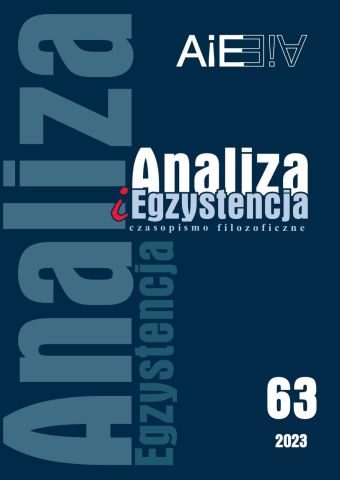
ISSN: 1734-9923
eISSN: 2300-7621
OAI
DOI: 10.18276/aie.2023.63-03





Lista wydań /
63 (2023)
Gramatyka nieskończoności. Ludwiga Wittgensteina krytyka teorii mnogości
| Autorzy: |
Piotr
Dehnel

Pomorska Szkoła Wyższa w Starogardzie Gdańskim |
| Słowa kluczowe: | Cantor Dedekind język teoria mnogości nieskończoność dowód przekątniowy. |
| Data publikacji całości: | 2023 |
| Liczba stron: | 33 (55-87) |
Abstrakt
Artykuł omawia Wittgensteina krytykę teorii mnogości. Przedstawiam jego zarzuty skierowane wobec teorii Dedekinda i Cantora związane przede wszystkim z definicją zbioru nieskończonego jako nieskończonej ekstensji oraz z dowodem przekątniowym Cantora. Omawiam także jedną z głównych tez Wittgensteina, że pojęcia teorii mnogości odnoszące się do nieskończoności i wyrażone symbolami אₒ i c, nie mają żadnych zastosowań poza matematyką w realnym świecie. Tworzą dyskurs, który wiedzie nas poza horyzont codzienności i wspólnoty, są jakby "jałowym biegiem" języka matematyki.
Pobierz plik
Plik artykułu
Bibliografia
| 1. | Bernays, P. (1959). Comments on L. Wittgenstein’s „Remarks on Foundation of Mathematics”. Ratio, 2 (1), 1–22. |
| 2. | Cantor, G. (1932). Gesammelte Abhandlungen mathematischen und philosophischenInhalts. Red. E. Zermelo. Berlin: Verlag von Julius Springer. |
| 3. | Cantor, G. (2003). O pozaskończoności. W: R. Murawski (wybór, przekład i komentarze), Filozofia matematyki. Antologia tekstów klasycznych (s. 174–196). Poznań: Wydawnictwo Naukowe Uniwersytetu im. Adama Mickiewicza. |
| 4. | Da Silva, J.J. (1993). Wittgenstein on Irrational Numbers. W: K. Puhl (red.), Wittgensteins Philosophie der Mathematik. Akten des 15. Internationalen Wittgenstein-Symposiums (s. 93–100). Wien: Verlag Hölder-Pichler-Tempsky. |
| 5. | Dauben, J.W. (1990). Georg Cantor: His Mathematics and Philosophy of the Infinite. Princeton: Princeton University Press. |
| 6. | Dedekind, R. (1909). Theory of Numbers. I: Continuity and Irrational Numbers II: The Nature and Meaning of Numbers. Tłum. W.W. Beman. Chicago: Open Court Publishing Company. |
| 7. | Dedekind, R. (2003), Ciągłość a liczby niewymierne. Tłum. R. Murawski. W: R. Murawski (wybór, przekład i komentarze), Filozofia matematyki. Antologia tekstów klasycznych (s. 152–167). Poznań: Wydawnictwo Naukowe Uniwersytetu im. Adama Mickiewicza |
| 8. | Dawson, R. (2014). Wittgenstein on Pure and Applied Mathematics. Synthese, 191, 4143–4148. |
| 9. | Ferreirós, J. (2007). Labyrinth of Thought. A History of Set Theory and Its Role in Modern Mathematics. Second revised edition. Basel–Boston–Berlin: Birkhäser. |
| 10. | Floyd, J., Mühlhölzer, F. (2020). Wittgenstein’s Annotations to Hardy’s Course of Pure Mathematics: An Investigation of Wittgenstein’s Non-Extensionalist Understanding of the Real Numbers. Cham: Springer. |
| 11. | Frascolla, P. (1994). Wittgenstein’s Philosophy of Mathematics. London–New York: Routledge. |
| 12. | Frege, G. (1993). Begriffsschrift, eine der arithmetischen nachgebildete Formelsprache des reinen Denkens. Red. I. Angelelli. Hildesheim–Zürich–New York: Georg Olms Verlag. |
| 13. | Glock, H.-J. (2001). Słownik Wittgensteinowski. Tłum. M. Hernik, M. Szczubiałka. Warszawa: Wydawnictwo Spacja. |
| 14. | Gomułka, J. (2016). Rachunek. Filozofia nauk formalnych i jej związek z konepcją podmiotu we wczesnym i średnim okresie twórczości Ludwiga Wittgensteina. Kraków: Wydawnictwo Naukowe Uniwersytetu Papieskiego Jana Pawła II. |
| 15. | Kuratowski, K., Mostowski, A. (1978). Teoria mnogości. Warszawa: PWN. |
| 16. | Kuusela, O. (2019). Wittgenstein on Logic as the Method of Philosophy. Oxford: Oxford University Press. |
| 17. | Maddy P. (1993). Wittgenstein’s Anti-Philosophy of Mathematics. W: V. Phul (red.), Wittgenstein’s Philosophy of Mathematics (s. 42–72). Vienna: Verlag Hölder- |
| 18. | Pichler-Tempsky. |
| 19. | Marion, M. (1998). Wittgenstein, Finitism, and The Foundations of Mathematics. Oxford: Clarendon Press. |
| 20. | Methven, S.J. (2015). Frank Ramsey and the Realistic Spirit. Basingstoke: Palgrave Macmillan. |
| 21. | Methven, S.J. (2020). Ramsey’s Record: Wittgenstein on Infinity and Generalizations. British Journal of History of Philosophy, 18 (6), 1116–1133. |
| 22. | Moore, A.W. (1991). Infinity. London: Routledge. |
| 23. | Murawski R. (2021). On the Reception of Cantor’s Theory of Infinity (Mathematicians vs. Theologians). W: M. Trepczynski (red.), Philosophical Approaches to the Foundations of Logic and Mathematics (s. 211–237). Leiden: Brill. |
| 24. | Murawski R. (2018). Szkice z filozofii i historii matematyki i logiki. Poznań: Wydawnictwo Naukowe Uniwersytetu im. Adama Mickiewicza. |
| 25. | Pérez-Escobar, J.A., Sarikaya, D. (2022). Purifying Applied Mathematics and Applying Pure Mathematics: How a Late Wittgensteinian Perspective Sheds Light onto the Dichotomy. European Journal for Philosophy of Science, 12 (1), 1–22. |
| 26. | Potter, M. (2000). Reason’s Nearest Kin. Philosophies of Arithmetic from Kant to Carnap. Oxford: Oxford University Press. |
| 27. | Putnam, H. (2007). Wittgenstein and the Real Numbers. W: A. Crary (red.), Wittgenstein and the Moral Life. Essays in Honor of Cora Diamond (s. 235–251). Cambridge: The MIT Press. |
| 28. | Rodych, V. (1995). Pasquale Frascolla, „Wittgenstein’s Philosophy of Mathematics”. Philosophia Mathematica, 3, 271–288. |
| 29. | Rodych, V. (1997). Wittgenstein on Mathematical Meaningfulness, Decidability and Application. Notre Dame Journal of Formal Logic, 38 (2), 195–225. |
| 30. | Rodych, V. (2000). Wittgenstein’s Critique of Set Theory. Southern Journal of Philosophy, 37, 281–319. |
| 31. | Rotter, K. (2006). Gramatyka filozoficzna w dobie sporu o podstawy matematyki. Eseje o drugiej filozofii Wittgensteina. Opole: Wydawnictwo Uniwersytetu Opolskiego. |
| 32. | Ramsey, F. (1950). General Propositions and Causality. W: F. Ramsey, The Foundations of Mathematics and Other Logical Essays. Red. R.B. Braithwaite (s. 237–256). London: Routledge. |
| 33. | Schroeder, S. (2014). Mathematical Propositions as Rules of Grammar. Grazer Philosophische Studien, 89 (1), 23–38. |
| 34. | Schroeder, S. (2020). Wittgenstein on Mathematics. New York: Routledge. |
| 35. | Shanker, S. (1987). Wittgenstein and the Turning-Point in the Philosophy of Mathematics. London – New York: Routledge. |
| 36. | Wright, G.H. von (1982). Wittgenstein. Oxford: Basil Blackwell. |
| 37. | Wright, G.H. von (2000). Wittgenstein i jego czasy. W: L. Wittgenstein, Uwagi różne. Tłum. M. Kowalewska (s. 141–157). Warszawa: Wydawnictwo KR. |
| 38. | Wrigley M. (1998). A Note on Arithmetic and Logic in the „Tractatus”. Acta Analytica, 21, 192–131 |